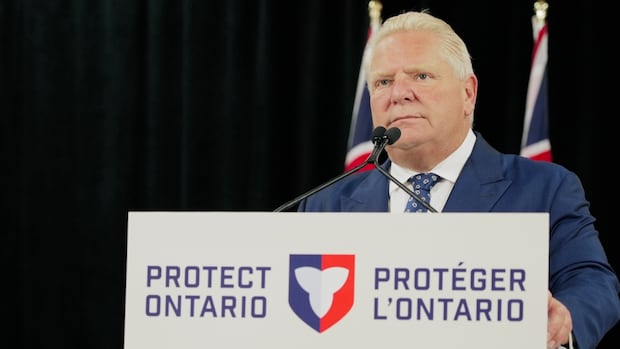
"Ontario's economy is going to continue to slow this year as U.S. tariffs reduce demands for exports and businesses cut back on investments and hiring, a new report estimates. The province's real GDP growth is projected to slow to 0.9 per cent this year and 1.0 per cent next year due to the impact of U.S. tariffs, says the report from the Financial Accountability Office of Ontario (FAO), released Wednesday."
"'If we didn't have the tariffs, we expect that growth would have been around 1.7 per cent in 2025 and a little stronger at 1.9 per cent in 2026,' Paul Lewis, chief economist at the FAO, said at a virtual media briefing Wednesday. Even as the economy adjusts and the growth rates move back to its long-term average, the damage has been done, Lewis said, and Ontario's real GDP would be 1.9 per cent lower than in a no tariff scenario in 2029."
"The report also projects that the Ontario budget balance will deteriorate from a deficit of $1.3 billion in 2024-2025 to a deficit of $12 billion in 2025 and 2026. The deficit will gradually improve and reach $7.9 billion in 2028-2029, but the province won't return to balance, Lewis said. 'We have a deficit of $9 billion in 2029 and 2030 as spending growth led by the health sector and interest on debt exceeds revenue growth,' he said."
U.S. tariffs reduce demand for Ontario exports and cause businesses to cut investment and hiring, slowing provincial economic growth. Real GDP growth is projected to slow to 0.9 per cent in 2025 and 1.0 per cent in 2026. Growth is expected to return to the long-term trend of about 1.9 per cent annually between 2027 and 2029 as the economy adjusts. Despite later normalization, Ontario's real GDP is forecast to be 1.9 per cent lower in 2029 relative to a no-tariff scenario. Provincial budget deficits widen sharply, driven by health spending and interest on debt, preventing a return to balance through 2030.
Read at www.cbc.ca
Unable to calculate read time
Collection
[
|
...
]